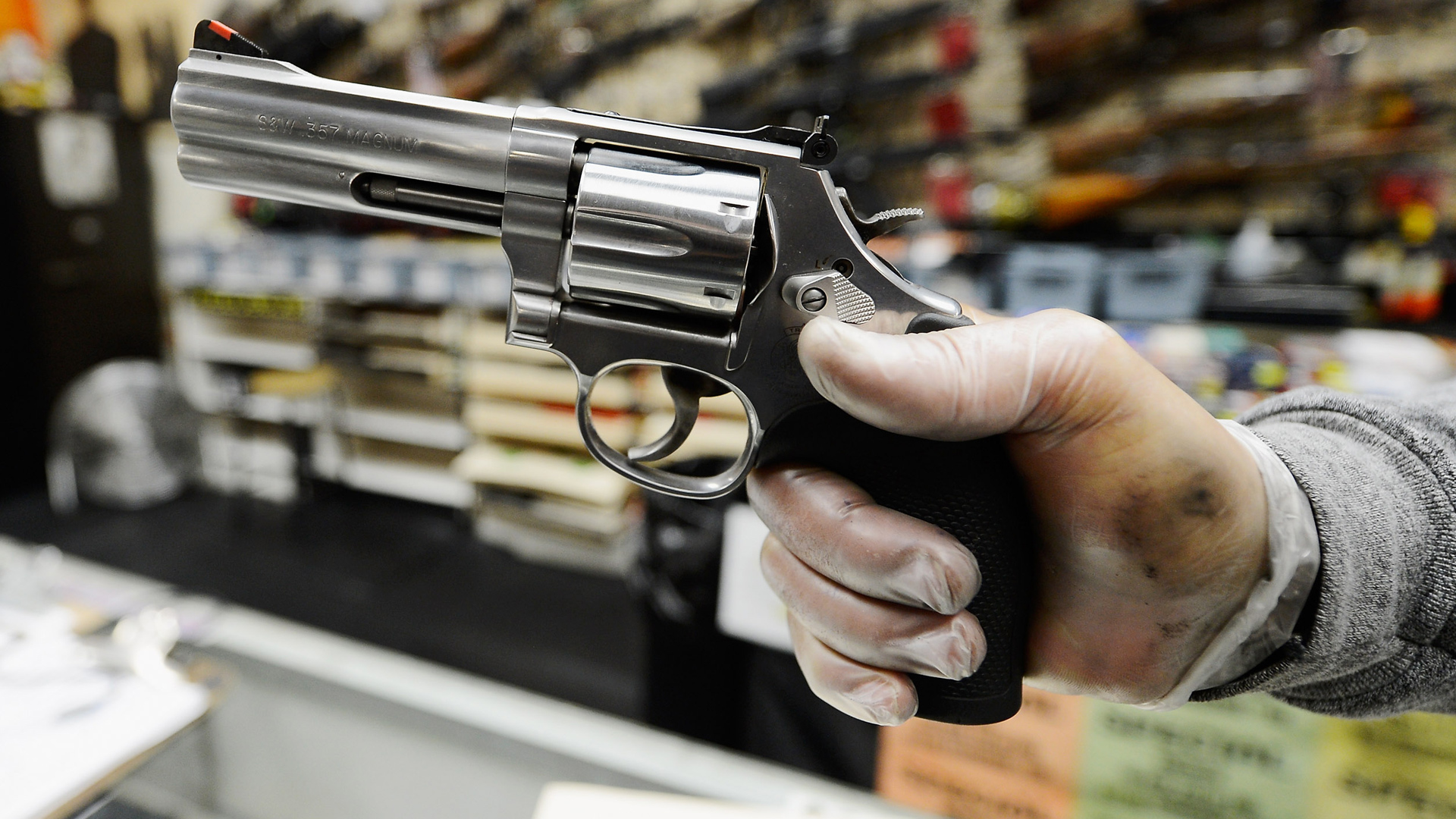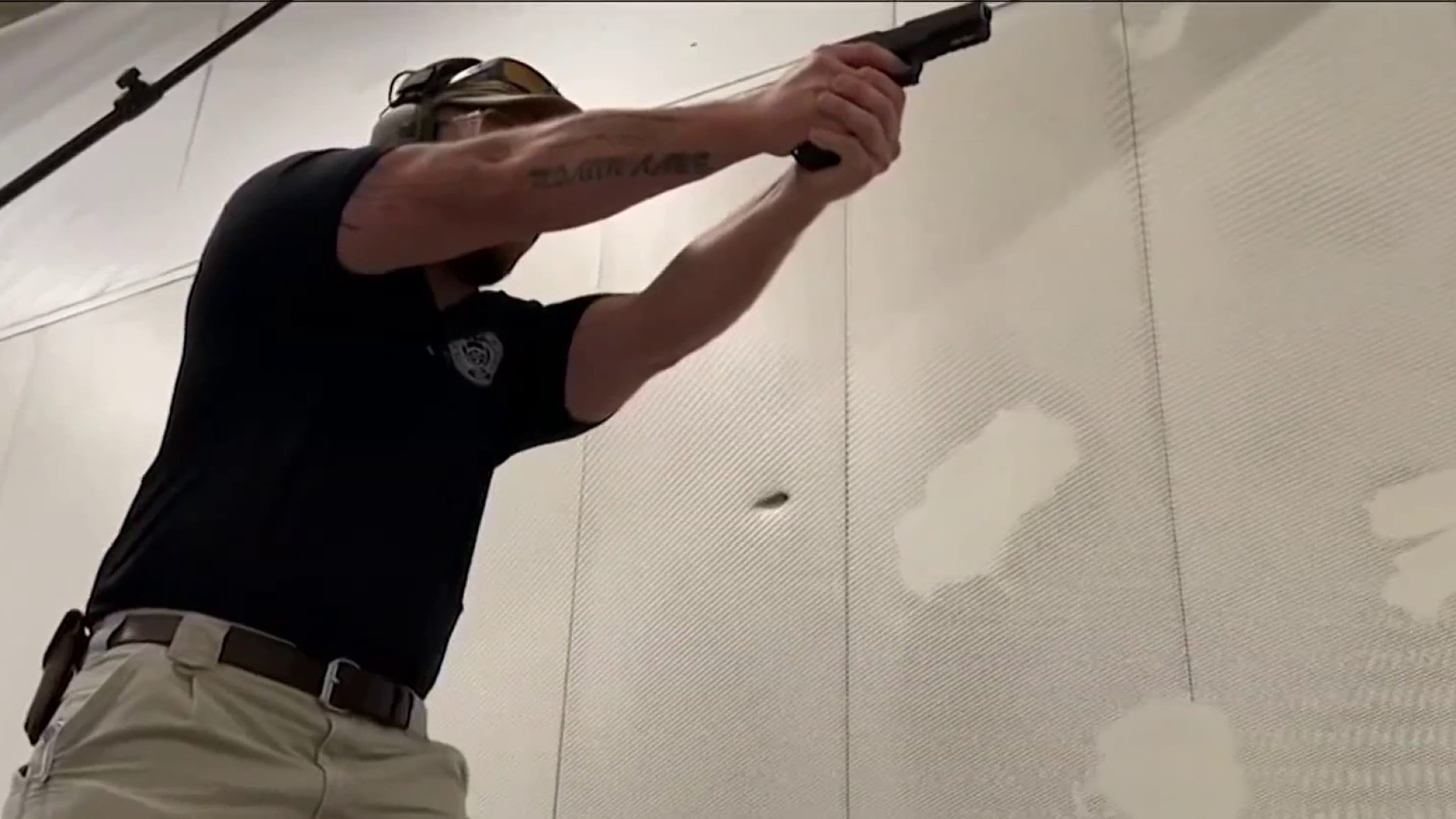In the first three months of 2024, hundreds of people were arrested in Virginia for trying to buy a gun they had no legal right to own.
Virginia State Police admit it is “a staggering number” of arrests for violating laws that prohibit felons, domestic abusers, those committed to mental health institutions and others from owning weapons. The News4 I-Team couldn’t find any program in D.C. or Maryland similar to Virginia's.
Lt. Dominic Sottile knows his team at Virginia State Police’s Firearms Transaction Center has stopped thousands of people with no right to buy a gun from getting one. He said they’ve stopped almost half of them just minutes before they got the gun, while the would-be buyer was still in a gun store.
“We don't want guns being given to those who aren't legally allowed to possess them,” Sottile told the I-Team.
We've got the news you need to know to start your day. Sign up for the First & 4Most morning newsletter — delivered to your inbox daily. Sign up here.
The program is recognized by gun safety advocates and, according to Sottile, by other law enforcement agencies as a nationwide leader in enforcing gun laws.
“It definitely plays a role in crime prevention,” Sottile said.
It also has prevented “countless” suicides, he said.
Suicide is the leading reason for gun deaths in the United States. People who have been ordered into in-patient mental health treatment are prohibited from buying guns, and Sottile says the Virginia State Police program has helped prevent suicides.
“I've had many of those where they were trying to commit suicide, and you could tell it was just an avenue for them to do so," he said. "These transactions prevent these types of incidents from happening.”
Federal law requires any gun owner to fill out and submit federal background check paperwork prior to buying a gun. It asks about criminal history, mental health history and several other questions.
Virginia is one of 14 states across the country that requires a state background check as well. Virginia State Police handle both the federal and state checks which allows it to seem them in real time.
States and jurisdictions like D.C., which rely on the FBI to do the checks, can’t see them in real time.
According to data from Virginia State Police, 134,125 people submitted background checks to buy guns from January through March of this year. Almost all of them were approved, but when they aren’t or another red flag comes up, Virginia State Police investigate. They have 15 troopers stationed full time in the state’s major population centers, and when a questionable transaction comes into the Richmond nerve center, a trooper is dispatched to the gun store immediately.

According to Sottile, roughly 40% of the team’s arrests of prohibited buyers happen on the spot in a gun store. The others are arrested after investigation by a trooper.
Through the end of March, VSP had arrested 529 people “related to the sale or attempt to purchase firearms as a result of denied transactions.” Last year, there were more than 2,200 arrests.

Inside NOVA Armory, an Arlington gun dealer, owner Shawn Poulin is well aware of the state police program and said selling more guns isn't always the most important job.
"We want to keep firearms out of the wrong young person's hands,” he said.
He said he sees troopers in the store “all the time.”
Christian Heyne, a gun violence survivor and the chief policy and programs officer for gun violence prevention organization Brady, told the I-Team programs that use local and state law enforcement can be more effective.
“It is important to keep guns out of the hands of prohibited buyers," Heyne said. "This is one way that Virginia State Police reacts to an imminent threat, and in doing so, they leverage the relationships local law enforcement have with gun dealers and the people in their communities.”
Far from viewing troopers as bad for business, Poulin wishes more agencies would do what Virginia State Police are doing. He’s also a legal gun dealer in Washington, D.C.
“The enforcement of the front-end regulations concerning firearms transactions is enforced differently, Virginia versus D.C.," he said.
While D.C. police don't have a specialized unit like Virginia's, it can still enforce firearm restrictions. But when the I-Team tried to find out if they have done so, the Metropolitan Police Department police pointed to the Bureau of Alcohol, Tobacco, Firearms and Explosives. That agency investigates only when someone fails the background check but somehow still obtains a gun.
ATF told the I-Team that only happened "maybe once or twice in the last five years," adding, "As far as the gun purchase itself, the ATF doesn't have anything to do with it. Prohibited buyers attempting to buy a firearm in D.C. is an issue that would fall to MPD."
Poulin says he heard a similar response from MPD. Poulin told the I-Team he calls D.C. police a handful of times a year when concerned about a questionable buyer in his shop, but nothing happens. In just one episode, Poulin said a would-be buyer “had an altered document that it was very apparent a third grader could have said this was two different documents."
He said MPD told him to call ATF.
“Yet,” Poulin said, “ATF ... That's not their job to enforce this kind of issue."
The I-Team spent three weeks trying to get D.C. police's take on the entire issue. Late on Friday, a spokesperson emailed the I-Team, saying, “The Metropolitan Police Department is focused on removing illegal guns from the streets of the District of Columbia. When it comes to legally registering a firearm, MPD uses strict guidelines and fingerprint-based background checks that enhance federal background checks to determine if an individual is legally permitted to register a firearm under DC Code. MPD does not have any unit assigned specifically to enforcement of prohibited people making willful misrepresentations in an attempt to legally purchase or transfer guns in the District. In 2023, MPD’s background check process prevented 323 people from legally registering a firearm in the District.”
In Maryland, where state law imposes a seven-day waiting period to buy a handgun, dealers and Maryland State Police say paperwork is almost always filled out online and away from the gun store with customers only showing up after their background check and waiting period have cleared.
Reported by Ted Oberg, produced by Rick Yarborough, shot by Jeff Piper and Steve Jones, and edited by Jeff Piper.
News4 sends breaking news stories by email. Go here to sign up to get breaking news alerts in your inbox.



